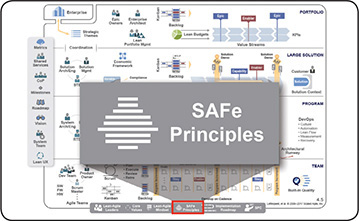- Principle #1: Take an economic view
- Principle #2: Apply systems thinking
- Principle #3: Assume variability; preserve options
- Principle #4: Build incrementally with fast, integrated learning cycles
- Principle #5: Base milestones on objective evaluation of working systems
- Principle #6: Visualize and limit WIP, reduce batch sizes, and manage queue lengths
- Principle #7: Apply cadence, synchronize with cross-domain planning
- Principle #8: Unlock the intrinsic motivation of knowledge workers
- Principle #9: Decentralize decision-making
Principle #8: Unlock the intrinsic motivation of knowledge workers

It appears that the performance of the task provides its own intrinsic reward … this drive … may be as basic as the others….
—Daniel Pink, Drive: The Surprising Truth About What Motivates Us
Lean-Agile Leaders must accept a relatively new, game-changing truth: The management of knowledge workers is an oxymoron. As Peter Drucker points out, “knowledge workers are individuals who know more about the work that they perform than their bosses” [2]. In that context, how can any manager seriously attempt to oversee or even coordinate the technical activities of people who are infinitely more capable than they are of defining the tasks necessary to accomplish their mission?
Indeed, they cannot. What managers can do is unlock the intrinsic motivation of knowledge workers. Some guidelines are provided in the following sections.
Leverage the Systems View
Before delving into additional motivational constructs, we must note a significant insight: The Lean-Agile principles of SAFe are themselves a system, too. Moreover, the elements of this system collaborate to create a new and empowering paradigm. With SAFe, knowledge workers are now able to:
Communicate across functional boundaries
Make decisions based on an understanding of the economics
Receive fast feedback about the efficacy of their solution
Participate in continuous, incremental learning and mastery
Participate in a more productive and fulfilling solution development process—one of the most powerful motivations of all
Understand the Role of Compensation
Many organizations still operate from assumptions about human potential and individual performance that are outdated, rooted more in folklore than in science. They continue to pursue practices such as short-term incentive plans and pay-for-performance schemes in the face of mounting evidence that such measures usually don’t work and often do harm.
—Daniel Pink, Drive: The Surprising Truth About What Motivates Us
Pink, Drucker, and others have pointed out the fundamental paradox of compensation as a motivational factor for knowledge workers [1, 2]:
If you don’t pay enough, people won’t be motivated.
But after a point, money is no longer a motivator. That is the goal of intellectual freedom and self-actualization. When that state is achieved, the knowledge worker’s mind is free to focus on the work, not the money.
After this point, adding incentive compensation elements can shift the focus to the money, rather than the work, resulting in poorer employee performance.
Lean-Agile Leaders understand that ideation, innovation, and deep workplace engagement aren’t motivated by money, or even by the reverse—threats, intimidation, or fear. Such incentive-based compensation, often determined by individual management by objectives (MBO), causes internal competition and the potential destruction of the cooperation necessary to achieve the larger aim. In that competition, the enterprise is the loser.
Provide Autonomy with Purpose, Mission, and Minimum Possible Constraints
Pink asserts that knowledge workers have a need for autonomy—the ability to self-direct and to manage their own lives. Providing autonomy, while harnessing it to the larger aim of the enterprise, is an important leadership responsibility [1].
Managers and workers also know that the motivation of self-direction must occur within the context of the larger objective. To this end, leaders must provide some larger purpose—some connection between the aim of the enterprise and a knowledge worker’s daily activities.
When building systems, knowledge workers collaborate as a team. Being part of a high-performing group is yet another critical motivation. Leaders can inspire teams to do their best by providing the following guidance [4]:
The mission, a general goal and strategic direction, and a strong vision
Little, minimal, or even no specific work or project plans
Challenging requirements, along with the minimum possible constraints as to how teams meet these requirements
Create an Environment of Mutual Influence
“To effectively lead, the workers must be heard and respected” [2] in the context of an environment of mutual influence [4]. Leaders create this kind of environment by giving tough feedback supportively, by showing a willingness to become more vulnerable, and by encouraging others to engage in positive ways:
Disagree where appropriate
Advocate for the positions they believe in
Make their needs clear and push to achieve them
Enter into joint problem-solving with management and peers
Negotiate, compromise, agree, and commit
We live in a new age, where the workers are smarter and have more local context than management can ever have. Unlocking this raw potential can significantly improve the lives of those doing the work, as well as provide better outcomes for customers and the enterprise.

